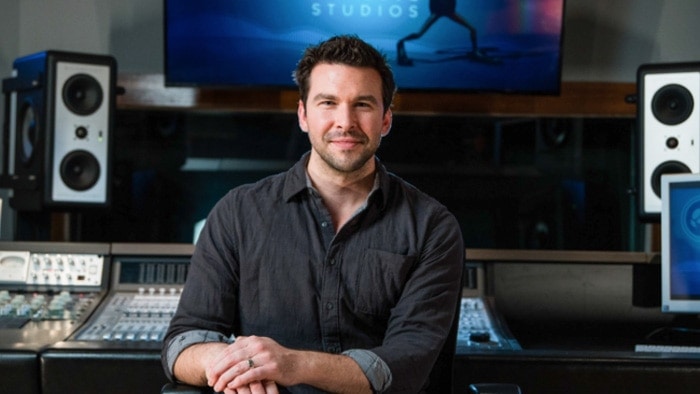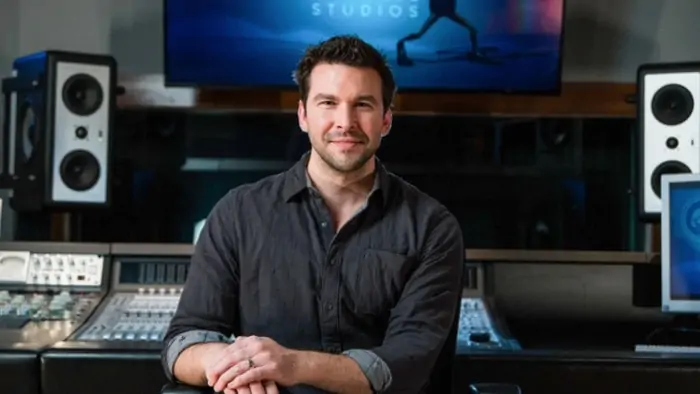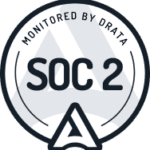
Peter: There’s so much we can talk about but the place I thought we’d start is you have a very cool YouTube channel with lots of very helpful tips: you go into everything from networking to whether you should work for free and all that kind of stuff. And I don’t mean this to sound as mean or skeptical as it does, but what qualifies you to give this advice?
Adam: Well, you know what, it’s funny about that question. I think by and large people who do what we do, like audio nerds, musicians, we get in our heads and a lot of us think we’re either God’s gift to earth or we’re not worth anything,. right. It’s kind of one of those two things. And honestly, I’ve always thought like if you’ve been in audio for 20 seconds or 20 years, you’ve got something to teach and you’ve got something to learn. Just because you haven’t been doing a long time, doesn’t mean you don’t have good ideas. Now what qualifies me? I don’t know, I’ve been doing it for 15 years. I’ve learned a couple of things!
I’m certainly not an expert, but I love to teach and I love to learn, and I think you get both by doing both. So that was the impetus for the channel. Locally a few years back I started to look around and I noticed there’s this funny thing where people in audio, we work in studios and it’s just four walls and no people, and you forget that there’s other people in your area who do the same thing. And sometimes we all get so busy with our work that we’re not talking to each other. So we get in these silos. But what we do have is the internet. We get on forums and groups and things like this. And for whatever reason, we’re sort of apt to like take somebody’s word for gospel that we’ve never met because they’re on the internet and they can write a cool post.
But when you start to talk to people around your area, for whatever reason, like I live in a small market, I live in Albany, New York. I’m not in New York or Chicago or London, some huge market. And there’s this mentality where it’s like, well, if you’re here, you must not be very good or you don’t know anything. But that guy that I saw on the internet, he knows what he’s talking about, or she knows what she’s talking about because it’s on the internet. So I started this local group here on a whim. I had an idea and 30 minutes later I wrote an email to 200 people in the area who were touching audio. And we got together here at the studio about a month later and there’s over a hundred people in attendance. And the whole idea was that it was doesn’t matter if you’ve been here 20 seconds or 20 years, you’ve got something to learn and something to teach, and understand that there’s people in your area who also have not necessarily the same passions as you, but have something valuable to offer. We can learn from each other and pick each other up.
So that was really cool. And then there was lockdown and then I was like, well, that’s not really the place now to meet up, so I ventured into YouTube, like people tend to do.
Peter: See, your channel is great because you seem like a natural communicator, and this kind of thing is like, whether it’s audio engineering or for guitar players or whoever, you always need someone saying like, “Dude, check this out.” You know, my standard thing I’ve mentioned in a few interviews is, no-one who wasn’t there at the time discovered Hendrix on their own. They always discover Hendrix because someone said “Dude, you’ve got to hear this guy.” And it’s the same with all this stuff. You know, “Dude, you haven’t tried sidechain compressing your bass yet?” We get to talking and this helpful stuff comes out.
Adam: And how cool is the feeling when you get to be the one who’s like, “I was able to introduce Hendrix to that dude”? I enjoy it and it’s not like “Oh I know more than you.” It’s like, “I got to give you something that I got really excited about. And if I felt that way, I know you feel that way too.” That makes me feel good.
Peter: So for those reading this, tell them a bit more about the kind of content they can expect on your channel.
Adam: Well, the focus of the channel is really to help people build and grow a career in audio. And I say audio broadly, intentionally, because I think there’s so much out there, there’s many ways to make a living and to have fun. It isn’t strictly music or film, and I know those are like the gateway drug, so to speak for people to get into the studio and start working in audio.
Adam: For some people that’s kind of it, that’s where they start and that’s where they end and there’s absolutely nothing wrong with that. I think that’s fantastic. But that doesn’t work as a career for everyone, right? I mean, there’s not a one size fits all, but there’s still people who are really good at the music thing, but maybe just aren’t really great at cultivating the business. Or maybe if they’re just able to do a little bit, a few other things in audio to supplement their income. Well then they don’t have to have that part-time job waiting tables or doing whatever nine-to-five thing that they really hate. And they can focus their passion on audio and on music and whatever other thing there is. So part of the channel is actually just showing all of those different places in which you can create a career, still have fun, being creative, engaging with people, doing some compelling work, whether that’s film music, voiceover, podcasting, it could be in branding marketing. It could be, you know, right now AI is huge and VR is huge immersive storytelling. I did work for Google years back for the whole Siri thing. My point is, there’s noise around us everywhere and there’s always somebody behind making that noise and they usually get paid to do that noise. So yeah, it’s just kind of just creating a channel and a place where people can go and get an idea and realise that of all the people in the world telling them that there might not be a future for them in music or an audio – because there’s plenty of those people – there’s at least one place. I know there’s more, but at least there’s one place that can be like, ‘No, shut all that stuff off, get the positive energy around you and realise that this is really the best time ever to work in this field because there’s so much opportunity.’
Peter: Another thing that comes up in these interviews a lot is that, well, COVID sucks, but it’s also brought together kinds of collaboration that people just weren’t trying yet. And now they’re forced to, and you know, that’s something that’s cool about Source is that, you know, Source-Connect is already there! The tools didn’t need to be developed to enable this stuff or to catch up because of lockdowns: it’s like it was already here waiting for you.
Adam: Yeah. For me, I’ve been using Source-Elements products for a while, so for me it was just a little bit of education for the people on the other side, for clients who weren’t aware, to get them kind of up to speed. And then as soon as you do that, I mean …I was down for maybe a week-ish after lockdown happened and then I was immediately taking phone calls from people that I hadn’t heard from in forever going, “Hey, remember we were talking about that thing? I’ve got all this time, can we do that now?” And I was like, “Well, I can’t see you, but yeah, we can totally do it, let me show you how,” and, you know, enter Source-Connect and bam, instant connection and collaboration. https://www.youtube.com/watch?v=w8lm4SmyHrI
And that right there, for people who had worked with me or hadn’t worked with me, that right there was huge as far as trust goes in in me and what I can do, and for me in my business. I think that goes so far, as far as creating a client and a customer for life. When they see that you just solved this huge problem and they can actually continue their business, you’re a hero really. I mean, I didn’t do anything other than just know about this product and connect us, but to clients that is huge.
Peter: So what kind of projects have you used Source-Connect on?
Adam: I’m quite literally using it right now for Bellator MMA as we speak. I’m actually literally recording a voiceover for Mohegan Sun Connecticut which will air tomorrow night. I’m on their core crew. I used to travel with them as their ProTools operator, but once again, when things hit the fan they got the bulk of the crew back together, but they’re just looking for any answers and how they can pare down the crew without firing people. And my position was one of few that we’ve figured out a way to make it happen remotely. So I’m remoting in a computer and using Source-Connect to monitor from my room in my truck. We went all over the country before COVID, and I can still do that.
And of course we do a lot of ADR here, for which Source-Connect is an absolute must. I haven’t yet used Source-Live though. I intend to very soon. I think that’s got some pretty big advantages, especially when I’m dealing with producers and script supervisors and sound supervisors who can’t always get to a studio now to monitor frame-accurate audio and picture. So we’re doing things like Zoom, which is a huge pain in the butt for them. It’s just a drag. We’re getting the job done because we have to, right? But it’s really not that great. So I’m looking forward to trying out Source-Live there. I do a lot of podcasts especially since lockdown and there’s a lot of products out there that I’ve tried that I really can’t recommend because they’re just shoddy and don’t sound all that great, and customer service is poor. And luckily for the clients that I get, they’re willing to invest in a better product. So I’ve got them on board with Source-Connect and I can just route everybody together here.
Peter: Cool! So tell me your superhero origin story. What got you into this in the first place?
Adam: It was always something in me that I wanted to do. I remember reading a book – I’m pretty sure it was Jurassic Park of all things – when I was like 12 years old and I saw the term ‘audio engineer’ and I was like, ‘That’s a thing?’ And then that was it. That’s just what I wanted to do and I just sort of made it happen. It wasn’t quick, you know? I mean, this was pre-internet and a small town. I grew up in a school of about a hundred kids. Guidance counselors had no clue what I was talking about when I was like, ‘I want to work in a recording studio.’ There, there was only one in town. It wasn’t like nowadays where you can probably find somebody in your circle who knows somebody who knows somebody who worked in a studio or has done something and kind of along the lines of what we do. But where I was back then, there literally wasn’t the ‘somebody who knew somebody.’ No one. [Guidance counselors] literally didn’t know what the hell I was talking about. The closest thing they could figure out was like, ‘You want to be a radio DJ?’ And I was like, ‘Well, this just …you guys aren’t really helping here.’ You know? So that was kind of a tough one.
Peter: Same! I wanted to write for guitar magazines and they were like, ‘Well, there’s the local newspaper. Maybe you could get a job at the local newspaper.’ And it’s like, that’s not really it dude.
Adam: I appreciate them trying but yeah, that was kinda tough, you know? But as people like us do, I picked up a guitar and played in bands and moved around with bands and had that life for a little while, and then eventually I finally started talking to somebody in a studio when I was recording with my band. And I was like, ‘Hey man, how did you learn how to do this?’ And he was like, ‘Oh, well there’s this school called Full Sail in Florida.’ And I had never heard of it. No one told me because again, nobody knew what I was talking about. So a month later I was at school! It was just one of those things where I really wanted to do it and I never let it go. It took a while for me to get there: this was several years after I graduated high school, but I never let that go.
Peter: Anything else you’d like to talk about before we call it a day?
Adam: Sure! So I work in a recording studio, but the studio is under the umbrella of a marketing company called over it. So that studio is called over at studios. The company is called Overit. We’re about 40 to 50 people, and that’s a digital marketing agency. It was started about 30 years ago by a drummer who was on a major record label deal on tour, thinking about his future. So in the mid nineties, he started this company and it’s grown into a multimillion dollar company.
Anyway, long story short, he always wanted a studio and about eight years ago he acquired this huge space. It’s an old converted church from the thirties. And I remember when I first met him, it was kind of funny: a friend of mine was like, ‘Hey, you know, you should know this guy, Dan Dinsmore. I think maybe there’s something there for you.” So I looked up the website and saw his marketing company. And I thought ‘I’m going to email Dan.’ Cause I’m kind of fearless that way. I’m thinking ‘This guy might be worth a job or two a year for me. I can maybe do some of his overflow for some commercial thing or whatever.’ So I wrote an email and was very nice, and I just said ‘Hey, we’d love to chat sometime. It looks like you’re doing great work. I do a lot in the audio space. I can do a lot of editing and mixing for you if there’s ever a time where you’re losing your hat and you just need an extra hand on a project, I can step in and help out.’
So he wrote back, ‘Hey, we should meet.’ So we meet. And again, I thought it was just somebody making websites and occasional videos. So he’s like, ‘Hey, let me take you for a tour.’ So he brings me over to this church, which is just all studs and bare bones? This huge empty place. And he’s like, ‘Alright. So this is where the desk is going to go, back here. This half of the building is going to be where the recording studio is going to go.’ And I’m thinking ‘What? Not what I was expecting to be talking about.’ And he’s like, ‘Consoles here, booth here, the big live room here and couches, lounge, this whole thing.’ And he was said he was going to need somebody to run it. And I was not really prepared for this, this is kind of coming out of left field for me. And so he gets done with the whole tour and I kind of stop him and I go, ‘Thanks for the tour. I’m really sorry you own recording studio.’ He’s like ‘What?’ I’m like, ‘Well you know, they don’t really make money. Like as a brick and mortar they’re really difficult. The overhead is astronomical.’ There’s just so much that goes into it just to get the ball rolling. You need so much money to build it and all those things. Studios in general are really not usually moneymakers which is why half of them shut down.
But what we’ve got going on here is amazing because you shared all this talent and all these resources under one building, and you’ve got shared overhead, and a built-in client infrastructure. There’s storytelling that helps sell service and sell products, and a creative voice that elevates and amplifies branding and brand loyalty and brand awareness and all these things. And it’s just harder to do that when you’re farming that stuff out to a third party. And if you’re buying that service, looking at an agency and trying to get someone to work with, it’s much easier to work with people who are all under one roof rather than hire this person, this agency for this effort and this agency for that campaign and this agency. We’ve got that system in place, so just by having a studio, it already gives extra value to every other service because we’ve got that better chance to get those contracts. And we do.
Peter: Hehehe. Well thanks much for your time. This has been really fun.
Adam: Thank you, Peter. I appreciate it!
Link: AdamClairmont.com
More info: https://overitstudios.com

